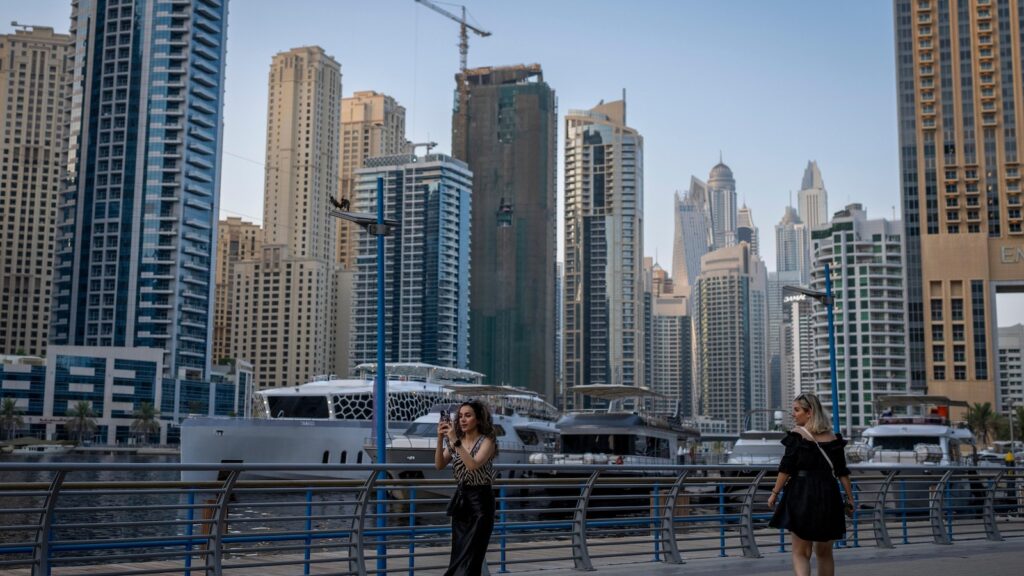DUBAI, United Arab Emirates — As conflict casts a shadow across the Middle East, people are getting rich in Dubai.
The desert sheikdom’s economy is buzzing with tourism and construction as it positions itself as a safe haven in a region that’s resting on a knife’s edge following the assassination of Hamas leader Ismail Haniyeh in Iran.
“Dubai is in a very unique position. We happen to be the net beneficiary of crisis in the region, for good or bad,” Zhann Jochinke, the chief operating officer of real estate consultancy Property Monitor, told The Associated Press.
Dubai has a long history of indirectly benefiting from crises in the region. When the ultra-wealthy worry about turmoil, the city offers stability, low taxes and a friendly visa system.
The current turmoil has situated Dubai to capitalize once again, as it did during the COVID-19 pandemic and Russia’s invasion of Ukraine.
Demand is running red hot in Dubai’s real estate market, catapulting glitzy properties to record-breaking valuations. Not even historic flooding in April could dampen the bull market.
State-backed Emaar Properties, whose name is splashed across Dubai’s skyline, announced that its development business made $8.1 billion in sales through the first half of the year, up from $5.2 billion over the same time period last year.
Across the city, valuations for Dubai’s upscale villas have set a new record, increasing around 38% in the second quarter of 2024 compared to last year, according to real estate consultancy ValuStrat. The average price for a villa — the local term for any freestanding home — exceeded $2.7 million for the first time in a decade. Rises in premium apartments are close behind with locations in Palm Jumeirah, a man-made archipelago jutting out into the Persian Sea, already surpassing 2014 peaks.
Tariq Shah, the head of sales at Pat & Co., a brokerage firm that deals in high-end properties, said the demand from his clientele seeking to buy has risen exponentially. “The demand for luxury is way above the expectation,” Shah told the AP.
Meanwhile, Dubai International Airport — the world’s busiest for international travel — saw a record 44.9 million travelers in the first half of this year. Dubai plans to move operations to a nearly $35 billion new airport in the next decade.
“We are heading for a forecast number for the balance of the year of 91.8 million passengers through DXB, which is again another record for us,” Dubai Airports CEO Paul Griffiths told the AP.
Some 9.3 million tourists visited the global hub through the first half of the year, beating pre-pandemic heights, according to research from the Dubai government-owned bank Emirates NBD.
The city state’s population has grown from 3.2 million in 2018 to nearly 3.7 million in 2024, with an additional 1.1 million who temporarily live in the city or commute there for work each day. The hereditary monarchy seeks to increase Dubai’s population to 5.8 million by 2040.
But some analysts are asking just how long the record-breaking upswing can last.
Some warned that an oversupply of housing could eventually slow the market if demand does not keep pace.
“From 2025 and 2026, there will be a vast new supply of new units that started construction back in 2021,” Tatjana Lescova, an analyst at S&P Global, told the AP. “It is by that time that essentially we think the new supply will not be fully absorbed by the market, and this could create the cyclical slowdown.”
Developers have already completed over 6,000 housing units through the first half of the year, and are expected to finish building another 20,000 by the end of the year, according to the state-run WAM news agency.
“They are big numbers, but they’re being absorbed,” said Property Monitor’s Jochinke. “People are buying them.”
